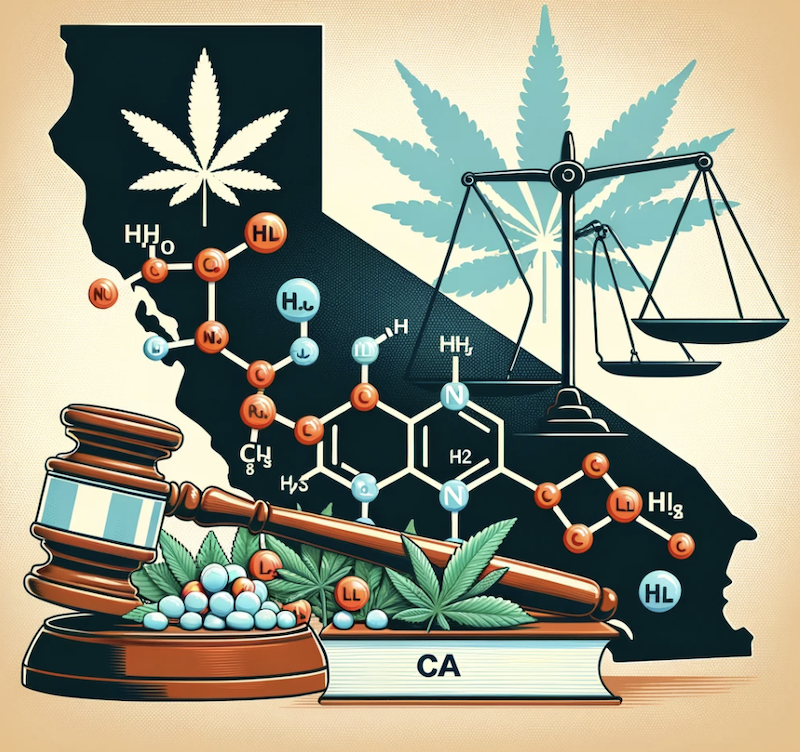Delta-10 THC, also known as D-10 THC, is a relatively new cannabinoid in the rapidly evolving cannabis industry. It is an isomer of Delta-8 and Delta-9 THC, which means it shares the same chemical formula but has a different arrangement of atoms. Delta-10 is a psychoactive compound naturally found in hemp plants, but only in trace amounts. As researchers continue to explore the potential benefits and effects of this newfound cannabinoid, its legality has become a point of curiosity and concern for consumers.
In California, Delta-10 THC is legal, which means that products containing this cannabinoid can be purchased (even from an online retailer) and consumed without facing criminal charges. However, it’s essential to know that cannabis laws vary by state, and what’s legal in California might not be allowed elsewhere. Conversely, consumers should always consult an experienced drug charge lawyer when facing legal issues related to cannabis use outside of California.
Although Delta-10 is a newcomer in the market, it presents an exciting opportunity for both the cannabis industry and consumers looking for new ways to enjoy the benefits of cannabinoids. Its legality in California broadens the options for those interested in trying different THC derivatives. However, as with any new product, it’s crucial to stay informed and adhere to the responsible use of Delta-10 THC.
Delta 10 THC: An Overview
Chemical Composition and Effects
Delta-10 is an isomer of the tetrahydrocannabinol (THC) family, found in trace amounts in the cannabis plant. It has a similar chemical composition to other cannabinoids such as Delta-9 THC and Delta-8 THC, but with some differences in its molecular structure. Like other THC cannabinoids, Delta-10 can produce psychoactive effects, but it is generally considered to be less potent than Delta-9 THC and similar in potency to Delta-8 THC.
The effects of Delta-10 can be more subtle than those of its counterparts, providing users with a unique experience that differs from the more intense high produced by Delta-9 THC. Some possible effects of Delta-10 might include:
- Mild euphoria
- Increased focus and creativity
- Calming and soothing sensations
However, more research is needed to fully understand the differences and potential benefits of this particular cannabinoid.
Delta 10 THC vs. Other Cannabinoids
While Delta-9 THC is known for its strong psychoactive effects, Delta-8 THC and Delta-10 THC share similarities in having milder effects on users. Here is a quick comparison of the three cannabinoids:
| Cannabinoid | Potency | Effects |
| Delta-9 THC | High | Strong psychoactive experience, pain relief |
| Delta-8 THC | Moderate | Mild high, relaxation, increased focus |
| Delta-10 THC | Moderate to low | Subtle high, increased creativity, calming |
Delta-9 THC is also the most well-known among these cannabinoids, with a long history of research and medical uses. In contrast, both Delta-8 and Delta-10 THC are still being studied to uncover more about their individual benefits and potential risks.
Regarding legality, Delta-10 THC derived from hemp is considered federally legal in the United States under the 2018 Farm Bill. However, some states have their own specific regulations, making it important to know the laws that apply in each jurisdiction. In California, hemp-derived Delta-10 THC products are legal, but it’s always recommended to verify the specific regulations before purchasing or using these products.
Legality of Delta 10 in California
California State Cannabis Laws
In California, cannabis laws are more permissive compared to other states, and this applies to Delta 10 THC as well. It is important to note that California has legalized both recreational and medicinal marijuana usage. This favorable legal climate extends to the legal status of Delta 10 THC in the state.
Delta 10 THC Legality Under Federal Law
Delta 10 THC, a cousin of Delta 8 and Delta 9 THC, is a hemp-derived cannabinoid. It is subject to regulations under the 2018 Farm Bill, which legalized hemp and its derivatives on a federal level. This means that as long as Delta 10 THC is sourced from hemp with less than 0.3% Delta 9 THC, it is considered legal under federal law. California, while having its own set of cannabis laws, aligns with the federal stance on Delta 10 THC, making it legal in the state.
Comparison With Other States
Compared to other states’ cannabis laws, California stands out with its liberal approach. While Delta 10 THC is legal on a federal level, there are still some states that have enforced stricter regulations, banning the substance altogether. For instance, Delta 10 THC is banned in states like Alaska, Arizona, Arkansas, Colorado, Delaware, Idaho, Mississippi, Montana, Rhode Island, and Utah. In contrast, California residents enjoy the freedom to access and consume Delta 10 THC products, placing the state among a group of more progressive states in terms of cannabis and hemp-derived cannabidiol laws.
In Conclusion
Delta-10 THC is a lesser-known isomer of THC that shares similarities with the more popular Delta-8 and Delta-9 THC compounds. Due to its molecular structure, Delta-10 THC provides milder psychoactive effects compared to Delta-9 THC and is known to be more stimulating than Delta-8 THC.
When it comes to legality in California, Delta-10 THC is considered legal as long as it is derived from hemp containing less than 0.3% Delta-9 THC. This is due to the 2018 Farm Bill, which classifies Delta-10 THC derived from hemp as a legal hemp product, allowing for its wider distribution and use across states where hemp products are permitted.
In summary, Delta-10 THC is a unique and emerging compound within the cannabis world that is legal in California under specific conditions. As research and knowledge on Delta-10 THC continues to grow, consumers can look forward to further understanding its properties, benefits, and potential applications.



















